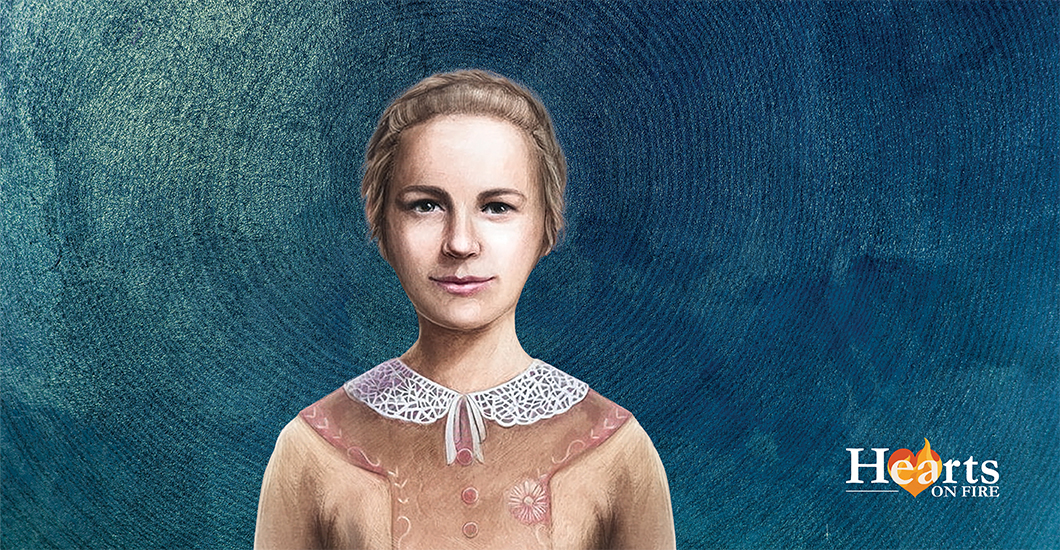- Latest articles

Does God have preferences and favorites?
My father, a first-generation Italian immigrant, had a warm, colorful, and inviting family. You’d be welcomed into their homes with double-cheeked kisses just as ever-present aromas of either espresso, garlic, focaccia, or cannoli welcomed your nose and stomach. My mother, on the other hand, had generations of thick deep multicultural roots in Kentucky. Her side of the family made the best southern apple pies, but had more distant and refined demeanors and affections. Each side of the family had its own set of behaviors and custom expectations to follow, and it was confusing to understand which way was correct.
These differences and the perceived need to choose between both have been a foundational dilemma for me. It seems as though I’ve always been trying to understand the world by seeking the ultimate source of truth.
Making Sense of it All
Throughout life, I’ve tried to find reasoning in how and why the world, and all its parts, function together. God must have known I’d be destined to question things and be inquisitive of His creations because He made sure I was pointed in the right direction to turn to Him. The Catholic Elementary school I attended had a young wonderful nun as one of my teachers. She seemed to have the same love and curiosity of the world that God had given me. If she didn’t have all the answers, I was pretty certain she knew who did.
We were taught that there was only one God and we were all made in the image and likeness of God. We’re unique, and God loves us all very much. He loved us so much that even before Adam and Eve knew the depth and ramifications of their sin, God already had the merciful plan of sending Jesus, His Son, to save us from that original sin. There was so much in that lesson for a little girl to unpack and understand. It still leaves me asking questions. However, it was the ‘image and likeness’ part of that lesson that I had to explore.
Observing my family, classroom, and community, it was obvious there were vast differences in hair color, skin color, and other features. If we are all unique, yet made in the image and likeness of only ONE God, then what did He look like? Was He dark-haired like me? Or blonde like my best friend? Was His skin olive colored, that tanned deeply in the summer, like my father’s and mine, or was He fair-skinned like my Mom, who turned red and burnt easily under the hot Kentucky sun?
Beautiful Varieties
I grew up with variety, was comfortable with variety, and loved variety, but I wondered—did God have a preference? In Kentucky, in the 1960s, it was apparent that even if God didn’t have a preference, some people did. That was so hard for me to understand. Didn’t the young Sister tell me that God made all of us? Doesn’t that mean that He purposely made all the wonderful varieties in this world?
I searched for the source of truth and sometime in my early 30s, a deep yearning to learn more about God led me straight into prayer and the Scripture. Here, I was blessed to learn that He was also looking for me. Psalm 51:6 spoke straight to my heart: “Behold, You desire truth in the innermost being, therefore teach me wisdom in my secret heart.” As time passed, God showed me there was a difference in the way He saw things versus how the world viewed things.
The more I read the Bible, prayed, and asked questions, the more I came to know that God is the source of truth. “Jesus said to him, ‘I am the way, and the truth, and the life. No one comes to the Father except through me.’” (John 14:6) How wonderful it was to finally understand that Jesus is the source of truth!
However, that was not all! God was the teacher now, and He wanted to make sure I understood the lesson. “Again Jesus spoke to them, saying: I am the light of the world. Whoever follows me will never walk in darkness but will have the light of life.’” (John 8:12) I had to read it again…Jesus said: ”I am the light of the world…” My brain began to speed up, gears began to engage, and things began to fall into place. My childhood science lessons taught me that ‘light is the source of all colors.’ Therefore, if Jesus is light, then He encompasses all the colors; all colors of the human race. That nagging childhood question was finally answered.
What Color is God? Quite simply, He is light. We are made in His image and likeness, and He has no preference for color because He is ALL color! All His colors are in us, and all our colors are in Him. We are all God’s children, and we are to “live as children of light” (Ephesians 5:8).
So, why is the world so sensitive about the many wonderful colors of human skin? God doesn’t prefer one color to another, so why should we? God loves us and all the variety of colors that He made us. It is quite simple, we are called to reflect Him. We are called to bring His light into the world. In other words, we are called to bring God’s presence into the world that doesn’t see things as God wants it to see things. He needs and wants all our varieties to complete His image. Let’s try to reflect Him in this world by being the light we are created from and for. As God’s children whom He loves, let us begin to appreciate all His images as part of the ONE God that made us.
'
It was the year 1944—the world was shaken by poverty and the travails of World War II. The war was nearing its end; Russian Army was liberating the Slovak Republic from Nazi occupation.
On the night of November 22, the Red Army had taken over the small village of Vysoká nad Uhom. Fearing the aggressiveness of violent Russian soldiers, people hid in their basements. 16-year-old Anna Kolesárová was hiding with her father and brother in the cellar of their house when a drunken soldier discovered them.
Out of fear, her father asked her to prepare food for the soldier. In an attempt to disguise her youth, she had worn long black clothes of her mother, who they had lost when Anna was ten. The soldier soon realized that Anna was only a teenager and attempted to force himself on her. The scared girl vehemently refused his advances. Aggravated by her actions, the soldier pointed a gun at her. Somehow, Anna escaped his grip and ran towards her father, shouting: “Goodbye, father!” With a rifle, he shot her in the face and chest.
This young girl, who had gone for the Holy Mass every day despite the alarming conditions prevailing in the region, succumbed to death with the final words: “Jesus, Mary, Joseph!”
The very same night, her father buried her in a makeshift coffin. A week later, Father Anton Lukac gave her a formal funeral, stating that Anna had received the Sacraments of Confession and Holy Communion before her death. After the church funeral, he wrote a note into the register of deaths: hostia sanctae castitatis (host of holy purity).
On her beatification on September 1, 2018, Pope Francis confirmed that the young Catholic girl had died in defensum castitatis, i.e., to preserve her virginity. With so many other Saints like Maria Goretti, she is now venerated as a virgin martyr.
'
The Rosary has changed me in more ways than I can understand. Our Lady is indeed a gateway to the Lord.
I remember a woman with whom I shared an adoration hour. She once told me about this young man who was struggling with depression; he was staying in and refusing to go out of his home, for maybe four years or more. On the way home, I prayed a Rosary for him and thought of it as nothing more than an ordinary Rosary. Truthfully, I didn’t expect anything to come of it.
The next week however, when I met up with the same lady, she said to me: “Sean, I’ve got an amazing story; it’s a miracle! Remember the young man I told you about last week? His car had been sitting idle for years, with dust all over it. He came out of his room, cleaned it, got in, and drove to meet up with his old university mates.”
I was amazed!
By showing me the fruit of one Rosary, God showed me how amazing it is when you pray, and how much transformation can happen when you pray more. So, I slowly went from one Rosary to four Rosaries a day, and there is no end to the wonders that have happened since.
'
Books were a luxury in 13th-century Italy. Hence, when someone went to the trouble of writing a book by hand, they treasured it beyond measure. Father Anthony had a book of Psalms he had copied by hand, with personal notes he referred to while teaching.
Once, a young novice left the community and took the treasured book with him. The priest was crestfallen, realizing his years of work were lost. No one knew where the novice had gone, so there wasn’t even a remote possibility of recovering the book. But Father Anthony did not lose heart; trusting in God’s providence, he prayed for the novice to have a change of heart and return the book.
Anthony’s prayer was soon answered, for the novice returned with a contrite heart. Asking for forgiveness, he gave the book back to the saintly priest who forgave him and accepted him back to the seminary.
After Father Anthony’s death, together with the many stories of his holiness, this story became quite popular. Thus, Saint Anthony of Padua came to be constantly invoked for finding lost things. Over the years, his reputation became so widespread that the Church officially declared him the patron Saint of lost items.
Saint Anthony had deep faith in God, enough to surrender his worries and trust His will. The next time we invoke the Saint to find our lost things, let us pray that he asks the Lord to grant us the kind of faith that led and strengthened him in Christ.
'
The greatest evangelist is, of course, Jesus himself, and there is no better presentation of Jesus’ evangelical technique than Luke’s masterful narrative concerning the disciples on the road to Emmaus.
The story opens with two people going the wrong way. In Luke’s Gospel, Jerusalem is the spiritual center of gravity— it is the locale of the Last Supper, the Cross, the Resurrection and the sending of the Spirit. It is the charged place where the drama of Salvation unfolds. So in walking away from the capital city, these two erstwhile disciples of Jesus are going against the grain.
Jesus joins them on their journey—though we are told that they are prevented from recognizing Him—and He asks them what they are talking about. Throughout His ministry, Jesus associated with sinners. He stood shoulder to shoulder in the muddy waters of the Jordan with those seeking forgiveness through the baptism of John; over and again, He ate and drank with disreputable types, much to the chagrin of the self-righteous; and at the end of His life, He was crucified in between two thieves. Jesus hated sin, but He liked sinners and was consistently willing to move into their world and to engage them on their terms.
And this is a first great evangelical lesson. The successful evangelist does not stand aloof from the experience of sinners, passing easy judgment on them, praying for them from a distance; on the contrary, she loves them so much that she joins them and deigns to walk in their shoes and to feel the texture of their experience.
Prompted by Jesus’ curious questions, one of the travelers, Cleopas by name, recounts all of the ‘things’ concerning Jesus of Nazareth: “He was a prophet mighty in word and deed before God and all the people; our leaders, though, put Him to death; we thought He would be the redeemer of Israel; this very morning, there were reports that He had risen from the dead.”
Cleopas has all of the ‘facts’ straight; there is not one thing he says about Jesus that is wrong. But his sadness and his flight from Jerusalem testify that he doesn’t see the picture.
I love the clever and funny cartoons in the New Yorker magazine, but occasionally, there is a cartoon I just don’t understand. I’ve taken in all of the details, I’ve seen the main characters and the objects around them, I’ve understood the caption. Yet, I don’t see why it’s funny. And then there comes a moment of illumination: though I haven’t seen any further detail, though no new piece of the puzzle has emerged, I discern the pattern that connects them together in a meaningful way. In a word, I ‘get’ the cartoon.
Having heard Cleopas’ account, Jesus say: “Oh, how foolish you are! How slow of heart to believe all that the prophets said.” And then He opens the Scriptures to them, disclosing the great Biblical patterns that make sense of the ‘things’ that they have witnessed.
Without revealing to them any new detail about Himself, Jesus shows them the form, the overarching design, the meaning—and through this process they begin to ‘get’ Him: their hearts are burning within them. This is the second great evangelical lesson. The successful evangelist uses the Scriptures in order to disclose the divine patterns and ultimately the Pattern who is made flesh in Jesus.
Without these clarifying forms, human life is a hodge-podge, a blur of events, a string of meaningless happenings. The effective evangelist is a man of the Bible, for the Scripture is the means by which we ‘get’ Jesus Christ and, through Him, our lives.
The two disciples press Him to stay with them as they draw near the town of Emmaus. Jesus sits down with them, takes bread, says the blessing, breaks it and gives it to them, and in that moment they recognize Him. Though they were, through the mediation of Scripture, beginning to see, they still did not fully grasp who He was. But in the Eucharistic moment, in the breaking of the bread, their eyes are opened.
The ultimate means by which we understand Jesus Christ is not the Scripture but the Eucharist, for the Eucharist is Christ Himself, personally and actively present. The embodiment of the paschal mystery, the Eucharist, is Jesus’ love for the world unto death, His journey into godforsakenness in order to save the most desperate of sinners, His heart broken open in compassion. And this is why it is through the lens of the Eucharist that Jesus comes most fully and vividly into focus.
And thus we see the third great evangelical lesson. Successful evangelists are persons of the Eucharist. They are immersed in the rhythms of the Mass; they practice Eucharistic adoration; they draw the evangelized to a participation in the body and blood of Jesus. They know that bringing sinners to Jesus Christ is never primarily a matter of personal witness, or inspiring sermonizing, or even exposure to the patterns of the Scripture. It is primarily a matter of seeing the broken heart of God through the broken bread of the Eucharist.
So prospective evangelists, do what Jesus did. Walk with sinners, open the Book, break the Bread.
'
Ever heard of the term cotyledon? As a seed germinates, these are present just beneath the seed coat, providing food for the embryo to grow.
They are crucial for the plant’s initial growth, but this role has a very short duration. Once the baby plant grows in size, develops more leaves, and begins the process of photosynthesis, the cotyledons will shrink and disappear. We see the flourishing plant parts and little or no thought is given to the life-preserving cotyledons that once sustained the baby plant from withering in its vulnerable stage.
Sometimes, we can also play the role of a cotyledon in others’ lives. It might be for a short period, but it can be very crucial in sustaining someone’s faith, self-assurance, or even their life itself. Without grand gestures or visible miracles, you can play a very significant role with simple daily acts of love, kindness, and compassion.
'
Ever experienced what it’s like to be in adoration? Colette’s beautiful account could be life-changing for you.
I remember that as a child, I used to think that speaking to Jesus in the Blessed Sacrament was either the most incredible or crazy notion. But that was long before I encountered Him. Years from that initial introduction, I now have a treasure trove of little and big experiences that hold me close to the Eucharistic Heart of Jesus, leading me ever closer, one step at a time…The journey is still on.
Once a month, the parish I attended then held an all-night vigil which would start with the celebration of the Eucharist, followed by adoration throughout the night, broken up into hours. Every hour began with some prayer, a Scripture reading, and praise; I recall, during the initial months, the first stirrings of that feeling of being so close to Jesus. Those nights were so focused on the person of Jesus and there, I learnt to speak to the Blessed Sacrament, as if Jesus Himself was standing there.
Later on, at a retreat for young adults, I came upon silent Eucharistic Adoration, which felt strange to me at first. There was nobody leading, and no singing. I enjoy singing in Adoration and I’ve always enjoyed people leading us in prayer. But this idea that I could sit and just be, that was new…At the retreat, there was a very spiritual Jesuit priest who would start adoration with: “Be still and know that I am God.” And that was the invitation.
Me and You, Jesus
I remember one specific incident that brought a profound realization of this stillness to me. I was at Adoration that day, my designated time had come to an end and the person who was supposed to be taking over from me hadn’t arrived. While I was waiting, I had a distinct impression from the Lord: “That person is not here but you are,” so I decided to just breathe.
They’d be here any minute I thought, so I focused on the presence of Jesus and was simply breathing. I realized, however, that my mind was leaving the building, getting busy with other cares, whereas my body was still there with Jesus. Everything that was going on in my mind suddenly camped. It was just a sudden moment, almost over before I realized what was happening. A sudden moment of stillness and peace. All the noises outside the chapel felt like music, and I thought: “My goodness, Lord, thank You…Is this what adoration is supposed to do? Lead me into a space where it’s just me and You?”
This made a deep and lasting impression on me, that the Eucharist is not something, it is Someone. In fact, it’s not just someone, it is Jesus Himself.
Priceless Gift
I think our perception of His presence and gaze plays a big role. The thought of the eye of God fixed on us may feel very scary. But in reality, this is a gaze of compassion. I experience that full-on in adoration. There is no judgment, only compassion. I’m someone who is very quick to judge myself, but in that gaze of compassion from the Eucharist, I’m invited to be less judgmental of myself because God is less judgmental. I suppose I’m growing into this in a lifetime of continuous exposure to the exposed Eucharist.
Eucharistic adoration has thus become for me a school of presence. Jesus is 100% present everywhere we go, but it’s when I sit in His Eucharistic presence that I’m alerted to my own presence and His. There, His presence meets mine in a very intentional way. This school of presence has been an education in terms of how to approach others too.
When I’m on duty in the hospital or the hospice and I’m meeting someone very ill, being a non-anxious presence to them is the only thing I can offer them. I learn this from His presence in Adoration. Jesus in me helps me be present to them with no agenda–simply to ‘be’ with the person, in their space. This has been a great gift to me because it frees me to almost be the Lord’s presence with others and to allow the Lord to minister to them through me.
There is no limit to the gift of peace that He gives. Grace happens when I stop and let His peace wash over me. I feel that in Eucharistic adoration, when I stop being so busy. I think that in my lifetime of learning so far, that’s the invitation: “Stop being so busy and simply be, and let Me do the rest.”
'
As Catholics, we have heard from the time we were little: “Offer it up.” From a little headache to a very serious emotional or physical hurt, we were encouraged to ‘offer it up.’ It wasn’t until I was an adult that I pondered the meaning and purpose of the phrase, and understood it as ‘redemptive suffering.’
Redemptive suffering is the belief that human suffering, when accepted and offered up in union with the Passion of Jesus, can remit the just punishment for one’s sins or the sins of another.
In this life, we are going to suffer various minor and major physical, mental, emotional, and spiritual trials. We can choose to grumble about it or we can surrender it all and unite our suffering with Jesus’ Passion. It can be redemptive not only for us, we can even help someone open their heart to receive Jesus’ healing and forgiveness.
We may never know in this life how offering up our sufferings has helped someone else break free of the bondages that have held them for so long. Sometimes, God allows us to experience the joy of seeing someone break loose from a life of sin because we offered up our suffering for them.
We can offer up our sufferings even for the poor souls in purgatory. When we finally arrive in Heaven, imagine those we were praying for and offering up our sufferings greeting us and thanking us.
Redemptive suffering is one of those areas that can be difficult to fully understand, but when we look at Scripture and what Jesus taught and how his followers lived, we can see that it is something that God is encouraging us to do.
Jesus, help me each day to offer up my little and big sufferings, difficulties, annoyances, and unite them to You on the Cross.
'
When she lost her mobility, eyesight, listening, voice, and even the sense of touch, what prompted this young girl to describe her life as ‘sweet?’
Little Benedetta, at age seven, wrote in her diary: “The universe is enchanting! It is great to be alive.” This intelligent and happy lass, unfortunately, contracted polio in her childhood, which left her body crippled, but nothing could cripple her spirit!
Hard Times on Roll
Benedetta Bianchi Porro was born in Forlì, Italy, in 1936. As a teenager, she began to go deaf, but despite this, she entered medical school, where she excelled, taking oral exams by reading the lips of her professors. She had an ardent desire to become a missionary doctor, but after five years of medical training and just one year short of completing her degree, she was forced to end her studies due to increasing illness. Benedetta diagnosed herself with neurofibromatosis. There are several iterations of this cruel disease, and in Benedetta’s case, it attacked the nerve centers of her body, forming tumors on them and gradually causing total deafness, blindness, and later, paralysis.
As Benedetta’s world shrank, she demonstrated extraordinary courage and holiness and was visited by many who sought her counsel and intercession. She was able to communicate when her mother would sign the Italian alphabet into her left palm, one of the few areas of her body that remained functional. Her mother would sign letters, messages, and Scripture painstakingly into Benedetta’s palm, and Benedetta would reply verbally despite her voice having been weakened to a whisper.
“They’d come and go in groups of ten and fifteen,” said Maria Grazia, one of Benedetta’s closest confidantes. “With her mother as interpreter, she was able to communicate with each one. It seemed as though she could read our innermost souls with extreme clarity, even though she couldn’t hear or see us. I will always remember her with her hand extended ready to receive the Word of God and her brothers and sisters.” (Beyond Silence, Life Diary Letters of Benedetta Bianchi Porro)
It’s not that Benedetta never experienced agony or even anger at this disease that was robbing her of the ability to become a medical doctor, but in accepting it, she became a doctor of another sort, a kind of surgeon to the soul. She was, indeed, a spiritual doctor. In the end, Benedetta was no less a healer than she ever desired to be. Her life had shrunken all the way down to the palm of her hand, it was no bigger than a Communion host—and yet, just like a Blessed Communion Host, it had become more powerful than she would have ever imagined.
It is impossible to miss the correlation between Benedetta’s life and Jesus in the Blessed Sacrament who is hidden and small too, silent and even weak, but an ever-present friend to us.
Towards the end of her life, she wrote to a young man who suffered similarly:
“Because I’m deaf and blind, things have become complicated for me … Nevertheless, in my Calvary, I do not lack hope. I know that at the end of the road, Jesus is waiting for me. First in my armchair, and now in my bed where I now stay, I have found wisdom greater than that of men—I have discovered that God exists, that He is love, faithfulness, joy, certitude, to the end of the ages … My days are not easy. They are hard. But sweet because Jesus is with me, with my sufferings, and He gives me His sweetness in my loneliness and light in the darkness. He smiles at me and accepts my collaboration.” (Venerable Benedetta Biancho Porro, by Dom Antoine Marie, OSB)
A Compelling Reminder
Benedetta passed away on January 23, 1964. She was 27 years old. She was venerated on December 23, 1993, by Pope John Paul II and beatified on September 14, 2019, by Pope Francis.
One of the great gifts that the Saints bring to the Church is that they give us a clear picture of what virtue looks like, even in incredibly difficult circumstances. We need to ‘see ourselves’ in the lives of the Saints in order to be strengthened for our own.
Blessed Benedetta is truly a model of sanctity for our times. She is a compelling reminder that even a life filled with serious limitations can be a powerful catalyst for hope and conversion in the world and that the Lord knows and fulfills the deepest desire of every heart, often in surprising ways.
A Prayer to Blessed Benedetta
Blessed Benedetta, your world became as small as a communion wafer. You were immobilized, deaf, and blind, and yet you were a powerful witness to the love of God and the Blessed Mother. Jesus in the Blessed Sacrament is hidden and small too, silent, immobilized, and even weak—and still all-powerful, ever present to us. Please pray for me, Benedetta, that I will collaborate, as you did, with Jesus, in whatever way He wishes to use me. May I be granted the grace to allow the Almighty Father to speak through my littleness and loneliness, too, for the glory of God and the salvation of souls. Amen.
'
Q – My many Christian friends celebrate ‘Communion’ every Sunday, and they argue that the Eucharistic presence of Christ is only spiritual. I believe Christ is present in the Eucharist, but is there any way to explain it to them?
A – It is indeed an incredible claim to say that at every Mass, a small piece of bread and a small chalice of wine become the very flesh and blood of God Himself. It is not a sign or a symbol, but truly the body, blood, soul, and divinity of Jesus. How can we make this claim?
There are three reasons why we believe this.
First, Jesus Christ said so Himself. In John’s Gospel, Chapter 6, Jesus says: “Amen, amen, I say to you, unless you eat the flesh of the Son of Man and drink His blood, you do not have life within you. Whoever eats My flesh and drinks My blood has eternal life, and I will raise him on the last day. For My flesh is true food, and My blood is true drink. Whoever eats My flesh and drinks My blood remains in Me and I in him.” Whenever Jesus says, “Amen, Amen, I say to you…”, this is a sign that what He is about to say is completely literal. Further, Jesus uses the Greek word trogon which is translated ‘to eat’—but really means ‘to chew, gnaw, or rip with one’s teeth.’ It’s a very graphic verb which can only be used literally. Also, consider the reaction of His hearers; they walked away! It says in John 6: “as a result of this [teaching], many of His disciples returned to their former way of life and no longer accompanied Him.” Does Jesus chase them down, tell them that they misunderstood Him? No, He allows them to leave—because He was serious about this teaching that the Eucharist is truly His flesh and blood!
Second, we believe because the Church has always taught it from its earliest days. I once asked a priest why there was no mention of the Eucharist in the Creed which we profess every Sunday—and he replied that it was because no one debated His Real Presence, so it wasn’t necessary to officially define it! Many of the Church Fathers wrote about the Eucharist—for example, Saint Justin Martyr, writing around the year 150 AD, penned these words: “For not as common bread and common drink do we receive these; but we have been taught that the food which is blessed by the prayer of His word, and from which our blood and flesh are nourished, is the flesh and blood of that Jesus who was made flesh.” Every Church Father is in agreement—the Eucharist is truly His flesh and blood.
Finally, our faith is strengthened through the many Eucharistic miracles in the history of the Church—over 150 officially documented miracles. Perhaps the most famous occurred in Lanciano, Italy in the 800s, where a priest who doubted Christ’s presence was shocked to find that the Host became visible flesh, while the wine became visible as blood. Later scientific tests discovered that the Host was heart flesh from a human male, type AB blood (very common among Jewish men). The heart flesh had been badly beaten and bruised. The blood had congealed into five clumps, symbolizing the five wounds of Christ, and miraculously the weight of one of the clumps is equal to the weight of all five taken together! Scientists cannot explain how this flesh and blood has lasted for twelve hundred years, which is an inexplicable miracle in itself.
But how can we explain how this happens? We make a distinction between accidents (what something looks like, smells like, tastes like, etc) and substance (what something actually is). When I was a young child, I was at my friend’s house, and when she left the room, I saw a cookie sitting on a plate. It looked delectable, smelled like vanilla, and so I took a bite…and it was soap! I was so disappointed, but it taught me that my senses could not always decipher what something actually is.
In the Eucharist, the substance of bread and wine change into the substance of Christ’s body and blood (a process known as transubstantiation), while the accidents (the taste, smell, look) remain the same.
It does indeed take faith to recognize that Jesus is truly present, since it cannot be perceived by our senses, nor is it something we can deduce with our logic and reason. But if Jesus Christ is God and He cannot lie, I am willing to believe that He is not a sign or symbol, but truly present in the Most Blessed Sacrament!
'
Tired of all that life is throwing at you? This super-food might be just what you need!
Homer’s Odyssey, Herman Melville’s Moby Dick, Jack Kerouac’s On the Road…all have something in common—the main characters are making their way through their respective life journeys. They can serve as a reminder to us that we are also on a journey.
Winner Takes it All
At the high point of Prophet Elijah’s life journey, he faces down the prophets of Ba’al, the pagan god. Elijah is on the top of Mount Carmel with 400 pagan prophets and challenges them to a prophetic duel. He says: “Then you call on the name of your god and I will call on the name of the Lord; the god who answers by fire is indeed God.”(1 Kings 18:24) It’s a great confrontation, a real test. One can imagine how this duel would have been promoted on Pay-for-TV!
The priests of Ba’al really get into it: they pray and dance themselves into a frenzy as if they were at a rage gathering, all the while calling upon their god to do his thing. Nothing happens. Elijah taunts them: “Cry aloud! Surely he is a god; either he is meditating, or he has wandered away, or he is on a journey, or perhaps he is asleep and must be awakened.” (1 Kings 18:27) So, they dial up their effort. They call and call, slash themselves with swords and spears until they are a bloody mess…of course, nothing happens.
In contrast, Elijah calmly calls upon Yahweh just once, who brings down fire to consume the sacrifice, proving that there’s only one true God: Yahweh. With that, the crowd is astounded, and all the people fall prostrate as they exclaim: “The Lord indeed is God; the Lord indeed is God.” (1 Kings 18:39). Elijah then commands the crowd to seize the pagan prophets and have them marched down to the brook Kishon, where he slits their throats. Talk about winner-take-all!
An Unexpected Twist
Well, one can imagine that the pagan Queen Jezebel was not a happy camper, having 400 of her prophets humiliated and slaughtered. She has to do something to save face and maintain her imperial prerogatives. If Ba’al is discredited, she will be as well, so she sends her secret police and troops after Elijah, who is now on the run. He is fleeing for his life, and if they catch him, they will murder him.
We hear that Elijah “went a day’s journey into the wilderness, and came and sat down under a solitary broom tree. He asked that he might die: ‘It is enough; now, O Lord, take away my life, for I am no better than my ancestors.’” (1 Kings 19:4) His life, which had just come to a high point with the confrontation of the pagan prophets, has now bottomed out. He’s discouraged, saddened, and so depressed that he wants God to take his life—he wants to die. He is tired of running.
The prophet’s prayer for death is not heard. His mission has not yet been completed. Then an angel of the Lord, a messenger from God, comes to him: “Suddenly an angel touched him and said to him: ‘Get up and eat.’ He looked, and there at his head was a cake baked on hot stones, and a jar of water. He ate and drank, and lay down again. The angel of the Lord came a second time, touched him, and said: ‘Get up and eat, otherwise the journey will be too much for you.’” (1 Kings 19: 5-7)
The angel directs him to Mount Horeb, which is another name for Mount Sinai, the holy mountain. Sustained by the mysterious food and drink, Elijah is able to walk for forty days, a very significant number as it signifies completeness in the Biblical context. He then receives a revelation, just as his ancestor Moses did. So, we have a story that begins with desperation and ends with the prophet once again actively engaged in the affairs of God.
Modern-day Jezebels
We may not be pursued by the agents of Jezebel, but we do have to contend with evil influences in our daily lives, so we can easily identify with the prophet Elijah. Many of us, especially those who have lived a while, reach this point where life is really difficult. We don’t have the energy that we once had when we were younger, and the enthusiasm for life has waned. Sometimes, it’s all we can do to get through the day, and that is before we had to contend with the pandemics, racial discord, threats to our democracy, and environmental degradation. Life has really beaten us up. There are only so many psychological blows that we can handle. On top of that, our religious practice has become way too familiar, even mechanical. Sometimes, it seems that we’ve lost our sense of direction or purpose. A lot of us have become like Elijah the prophet.
When we hit bottom like this, what do we need? The same thing Elijah did—sustenance for the journey and a renewed sense of direction and purpose. We find our sustenance in Jesus, who said: “I am the living bread … Whoever eats of this bread will live forever.” (John 6:51). Notice two things: Jesus, the living bread, is both the means and the end. Not only is He our sustenance for the journey, but He is also the destination.
The Food that We Become
When we celebrate the Holy Mass, we offer ourselves as a gift to God, symbolized by bread and wine. In return, we receive the self-gifting Real Presence of Christ himself. As we consume the Eucharist, we don’t make bread and wine become alive, rather, that consecrated, Heavenly bread makes us become alive because it assimilates us to it! When we receive His body and blood, we are receiving His soul and divinity. When that happens, we are drawn into His Being, into His divine Life. We now have the means to see as Jesus sees and to live a life similar to His— to value all we do as serving the Father.
The Eucharist is also the end of our journey. We have a taste of Heaven on Earth because we enter into the mystery of God. Through the Eucharist, we experience Heaven in space and time. We experience oneness with God, each other, and all of Creation. We experience a fullness of self, which is what our heart desires now and forever!
If you want to have sustenance and courage for the journey, make the Eucharist, the living bread, the very center of your life. If you want the joy and satisfaction of a life fully imbued with God, receive Jesus’ gift of living bread.
'